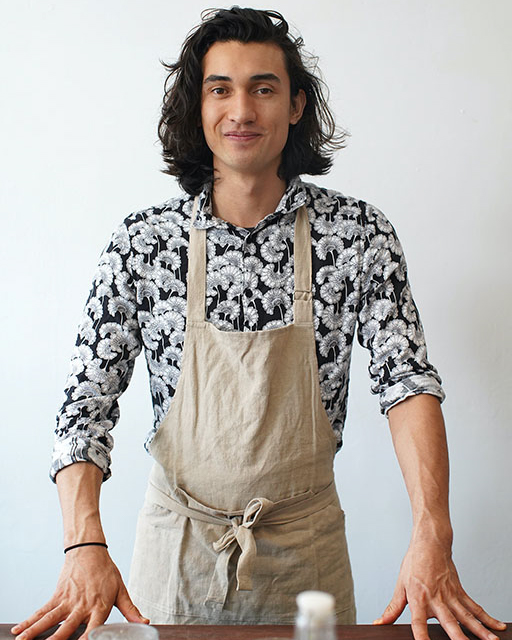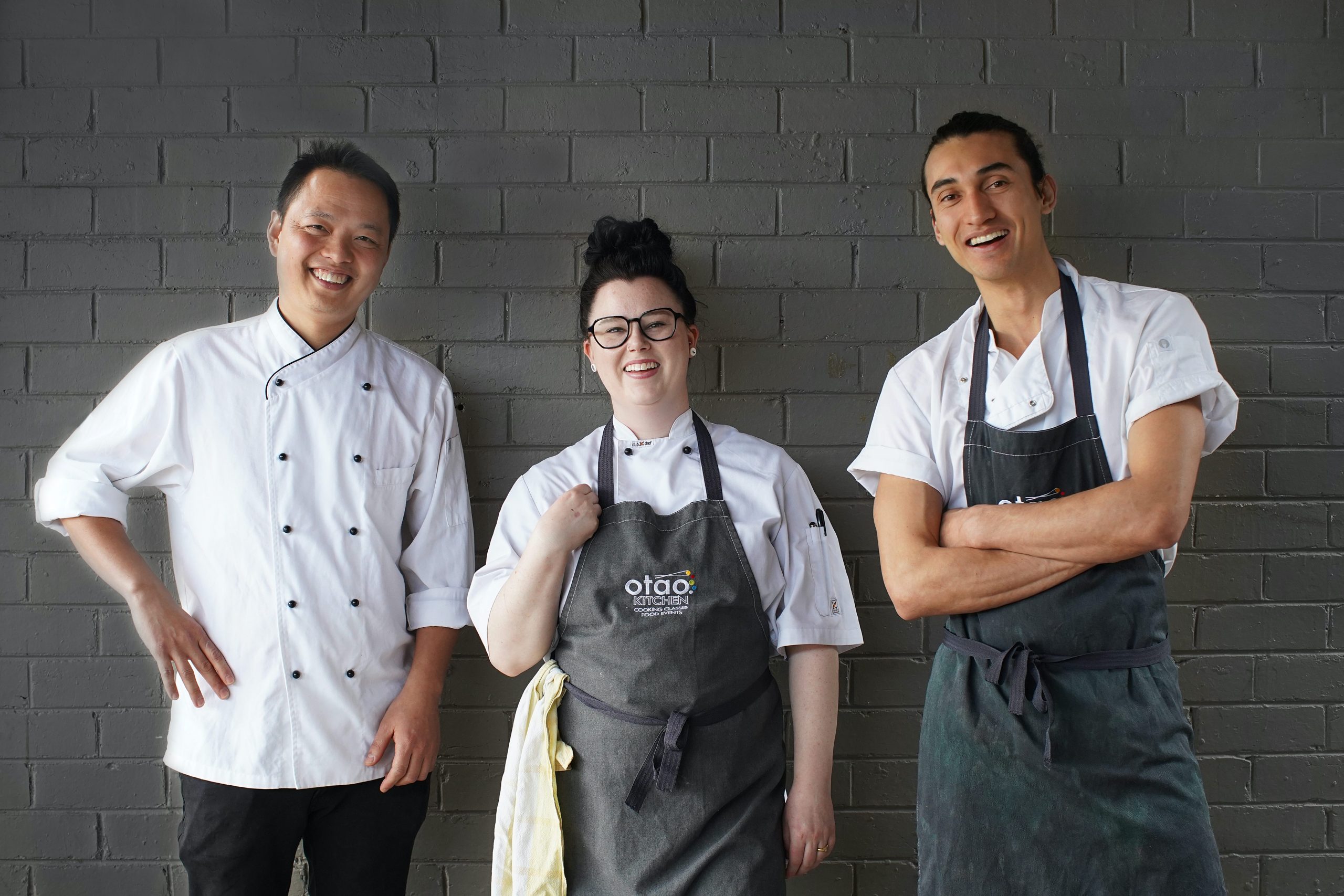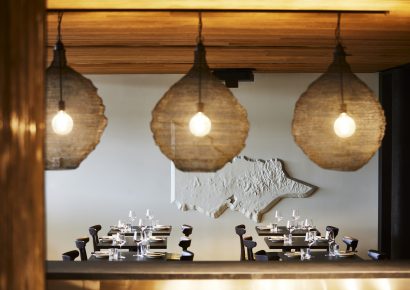One of Melbourne’s highest-regarded cooking schools shares their essential tips for learning to cook like a professional, on an everyday budget.
Everyone, deep down, secretly wants to be a chef. It’s hard to think of a more enviable skill than the ability to quickly and effortlessly craft meals that are cheap, healthy and taste incredible. However, if you’re anything like us, after a hard day’s work you get home, peek in the fridge, and just the thought of peeling a carrot is enough to send you straight to Uber Eats. Well bugger that.
To help remedy our naive laziness, we enlisted Otao Kitchen – one of Melbourne’s most renowned cooking schools, located in Abbotsford – and one of their long-standing head chefs, Dylan Vickers, to create a bit of a cheat sheet for us. Otao are kinda famous for helping laypeople like us become supremely confident in the kitchen by offering masterclasses in specific cuisines – you can choose your favourite takeaway nationality, rock up, have a glass of wine while you get hands on, and leave at the end of the day feeling like a nonna.
We love that idea, so we decided Dylan would be the perfect catalyst to transform us from utterly useless to…better. Below, he answers a few basic questions and a few slightly more complicated ones, tuck in.
Stay up to date with what’s happening in and around Melbourne here.

Flavours
First things first, we’ve heard that there’s a science behind cooking that can act as a checklist. So what are the basic flavours that need to be balanced for a successful dish?
Salt, sweet, acid, fat, savouriness, and nuance are all elements that need to be considered. Building a successful dish is navigating the interplay and dynamic relationship between flavours, and how they interact with each other. Acidity cuts through the richness of fats. Sweetness can calm the cloying sharpness of acid food. A few well-placed herbs can enliven an otherwise flat dish. A successful dish could either be a harmonious balance between these divergent polarities, or the highlighting of a particular taste in the broader context of a full meal. Consider a light, zesty and sour appetiser to wake the taste buds before a more heavy and substantial course.
Seasoning
One of the things people often forget is that seasoning doesn’t just happen at the end – it’s one of the most important facets from the beginning – so what’s the key to seasoning your dishes correctly?
Tasting! Tasting at every stage of the cooking process helps you judge the impact each additional ingredient has in changing the flavour of your dish as it develops. Tasting as you go also helps you build intuition as to the way salt manipulates and accentuates flavours, and it gives you insight into your own preferences for salt. While you should ultimately trust your own instincts for how much salt to use in your cooking, by tasting often, you can hone your intuitive sense for seasoning.
What are the spices everyone should have in the kitchen?
Too much emphasis is often placed on spices and ‘secret’ seasonings as a key to good cooking. Most peoples’ spice cupboards are filled with the tasteless dusts of long-expired spice bottles. It’s better to have three to four fresh, good-quality spices that you’ll use and replace often, than a multitude of stale and flavourless old spices. We keep a nice tin of pimenton – Spanish paprika, bright sumac, and za’atar on hand.
Cooking
What are the kitchen equipment staples every cook needs to own?
A well calibrated scale, a sharp knife and solid chopping board. In terms of food staples, a good-quality chilli oil, Japanese soy sauce, preserved lemons and miso.
What are the keys to following a recipe?
Get organised! Assemble all of your ingredients and equipment, and lay them out in front of you in a logical, and perhaps chronological order. Don’t wing it.
View this post on Instagram
Dishes
Name a quick and easy breakfast, lunch and dinner?
Perfecting one vegetable-loaded thick crust pan pizza seems appropriate for breakfast, lunch, and dinner.
If you want to master just one dish at the beginning, what should everyone start with?
Making a well-balanced and hearty salad is indispensable in this modern era of overwork, and fast pace. Being able to craft a tasty salad that can give you both rounded sustenance, while also being enjoyable is no easy feat. Something light and refreshing provides the ideal starter for any meal.
If you want to learn a particular cuisine in detail, what’s the best way to go about it?
Buy a few cookbooks and stick carefully to the recipes. You’ll get a better sense of how the dishes should be if you honour the traditional preparations of each cuisine. Then, once you’ve built a strong foundation of understanding you can wing it and experiment a bit.
What are the ideal dinner party dishes to complete your repertoire?
Stick to easy things that allow you to spend the most amount of time enjoying the company of your friends and family. There’s nothing like a massive cleanup of dishes to dampen the joy of a dinner party. Do a one-pot roast. Cut some vegetables, meat and have a hotpot. Grill some fish and chicken and just serve them with an assortment of lettuces, herbs and condiments. Have some raw fish and vegetables and have everyone make their own temaki- sushi handrolls. The more your guests can do themselves, the more interactive it is, and the more it loosens your own burden.
Turning pro
What’s the benefit to doing an actual cooking class?
With the widespread accessibility of internet cooking videos, there is now unprecedented access to culinary knowledge, and this is certainly a positive development. However, cooking is a multi-sensory and multi-dimensional experience that can’t yet (until we create Smell-O-Vision) be fully conveyed through the audio-video format. Doing a cooking class doesn’t just mean mechanically repeating a recipe we give to you, it means having someone to navigate through all of the changing textures, tastes, smells, techniques, and postures that delineate a skillfully prepared meal. Plus it’s thoroughly fun to cook, eat and drink in the company of others.
What about online cooking classes?
Our online cooking classes are created to be approachable and fun. We want to introduce people to new ways of preparing ingredients without them feeling like they have to run a cross-town marathon to hunt down obscure and hard to find ingredients. We want to make food that is easily replicable and inspires confidence.
Check out Otao Kitchen’s huge range of cooking classes here.
This article was made in partnership with Otao Kitchen

